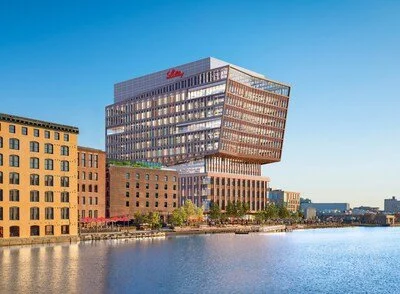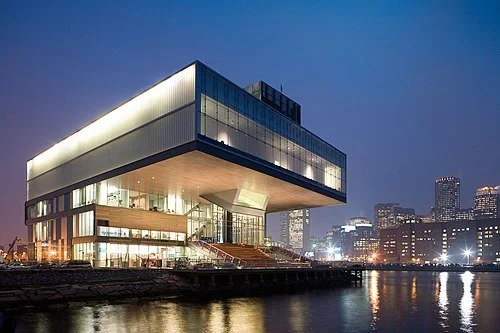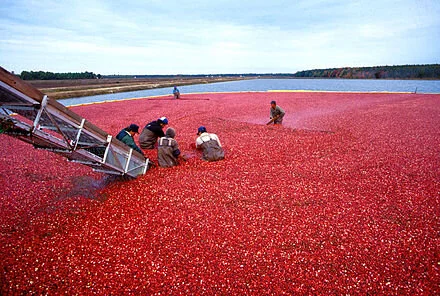
Lilly opens big R&D center in Boston’s Seaport District
Eli Lilly's Lilly Seaport Innovation Center
Edited from a New England Council report
On Aug. 13, Eli Lilly and Company announced the opening of the Lilly Seaport Innovation Center (LSC), a research-and-development facility in Boston’s Seaport District dedicated to furthering the company’s efforts in RNA and DNA-based therapies and discovering new drug targets to create transformative medicines for a range of conditions.
Lilly aims to use innovative biotechnology and medicine to create solutions to major health challenges. The new site will house the first Lilly Gateway Labs location on the East Coast, encouraging a culture of shared expertise and real-time learning to promote the development of novel medicines.
“The opening of LSC expands upon Lilly’s long-standing presence in the Boston area,” said Daniel Skovronsky, M.D., Ph.D., Lilly’s chief scientific officer and president of Lilly Research Laboratories and Lilly Immunology. ‘‘We are committed to being supportive neighbors in this hub of discovery and innovation, furthering collaborating with leading institutions and new talent to continue delivering transformative medicines for the people who need them the most.”
The perils facing Boston’s ‘Inundation District’
In the Seaport District, Boston Convention and Exhibition Center entry canopy at night.
— Photo by Generaltso (talk) (Uploads)
Text excerpted from The Boston Guardian
“As construction continues in such low-lying areas like the Seaport and East Boston, planners and private-sector insurance experts are warning developers and insurers to go beyond currently required building standards and consider what climate change will mean for potential flood hazards in future years.
"‘It's critical,’ said Martin Pillsbury, director of environmental planning for the Metropolitan Area Planning Council (MAPC). ‘I know there are costs involved and builders and developers always want to avoid costs, but if you ignore hazards, you're just potentially opening yourself up to loss down the road.’
"‘It drives me crazy when new developments say they're two feet above base flood elevation, but they're 10 feet below storm surge. Surge is a major risk in Boston,’ said Joe Rossi, president and CEO of Joe Flood Insurance and the founder of the Massachusetts Coastal Coalition ‘The Seaport probably should've been designed in a totally different way, that is only going to become more evident as we go down the road with more storms and environmental changes.”’
To read the full article, please hit this link.
Inundation District is a documentary film featuring interviews with residents and experts about the threats to Boston's shoreline and what the city can do now to contain the damage.
With affordable gondolas?
The Institute of Contemporary Art in Boston’s increasingly flood-prone Seaport District
Edited from a New England Council (newenglandcouncil.com) report
BOSTON
“The Massachusetts Port Authority (Massport) has seen significant interest from developers for a residential project with an affordable focus that the authority wants to build on land off D Street in Boston’s Seaport district. Massport has reported that nine teams have expressed a serious interest in the project.
“Massport estimates that its 27,000-square-foot site, adjacent to its South Boston parking garage, could accommodate a tower with as many as 18 stories and 200 apartments. The bidding teams are: Beacon Communities and RISE Together, The Community Builders and Menkiti Group, Cruz Development Corp., L&M Development Partners, The Michaels Organization and Boston Partnership for Community Reinvestment, Preservation of Affordable Housing and DREAM Development, Standard Communities, the Cronin Group, and the Caribbean Integration Community Development, Trinity Financial and the South Boston Neighborhood Development Corp., and Winn Companies and Catalyst Venture Development. Massport is expected to issue a formal request for proposals in the late spring or early summer.
“The New England Council commends Massport for working towards building affordable housing in the Seaport.’’
Ocean Spray invents four cranberry-herbal blends
Harvesting cranberries
From The New England Council (newenglandcouncil.com):
“Ocean Spray has launched its first ever new brand — ‘Atoka,’ a line of healthy, plant-based drinks. Founded in 1930, Ocean Spray is an agricultural cooperative owned by more than 700 cranberry farmers in the United States, Canada and Chile. {The heart of New England’s cranberry production is southeastern Massachusetts.}
The new brand’s products were developed by the Lighthouse, the cooperative’s innovation incubator in Boston’s Seaport District. Ocean Spray founded the Lighthouse to incite creative collaboration that would help keep their cranberry products modern, unique, and wellness focused. The cooperative’s farmer-owned structure inspired the Lighthouse team to create sustainable, nourishing food products. Atoka will introduce four cranberry-herbal blends in January of 2020 as Tea Tonics, Oatmilks Elixirs and Herbal Shots.
“Atoka is the first new brand to be incubated here in Boston at the Lighthouse, indicative of our emphasis on an intensely innovative, agile approach to product development and cultivating a culture of innovation throughout the organization,” said Rizal Hamdallah, global chief innovation officer at Ocean Spray. ‘Atoka brings Ocean Spray into an entirely new category of wellness drinks.”’
The Council congratulates Ocean Spray on their new brand, Atoka, and celebrates its mission of providing nourishing, wellness-focused products
Vegas on the Mystic
From Robert Whitcomb’s “Digital Diary,’’ in GoLocal24.com
I doubt that the gigantic Encore casino complex on the Mystic River in Everett, that gritty old waterfront industrial city next to Boston, will steal much business from Twin River’s two Rhode Island casinos. Getting in and out of Boston, parts of which are often gridlocked, is too daunting, although I’m sure that many curious people from Greater Providence will check out Encore at least once. And it may lure a lot of tourists in Boston and Cambridge, e.g., people attending big medical and other professional meetings there who want some glitz and the adrenaline from gambling’s greed and fear, as well as very local gambling addicts who will henceforth spend much of their time in Everett, of all places, destroying their finances.
Meanwhile, maybe we’ll learn more about how to boost waterborne traffic in coastal cities by seeing how well Encore’s ferry service to the casino works.
Jim Folk, the casino’s transportation director, told WBZ: “It’s going to be great for the public. We’re going to actually be making connections from the South Shore where the MBTA runs service from Hingham and Hull into Boston and we can go and take those folks over from Boston to the North Shore.” Expand the epidemic!
The ferry will run seven days a week from about 7 a.m. to midnight on a triangular route connecting people to the casino, the World Trade Center, in the Seaport District, and Long Wharf downtown.
Fares will be $5-$7 depending on the route and will be open to the public, whether or not they’re going to the casino.
Anything to get people off the roads and the MBTA.
A corporate move that worked for a state
From Robert Whitcomb’s “Digital Diary,’’ in GoLocal24.com
Massachusetts is making back the $87 million that it spent on Boston property connected with General Electric’s headquarters move there – plus $11 million in profit, helped by the city’s booming economy. (GE, however, has not been booming.) Also, the company has not taken the $25 million in tax breaks offered by Boston. GE will remain in the Seaport District, but with a considerably smaller footprint than foreseen when the company decided to move its headquarters from Connecticut.
So some government incentives to lure companies work out okay. That especially when you’ve got a highly competent governor such as Bay State Republican Gov. Charlie Baker and Boston’s able Democratic Mayor Marty Walsh who craft careful offers to protect taxpayers
Put office workers on boats
An MBTA ferry arrives at Rowe’s Wharf, on the Boston waterfront. It’s named after a popular historian of the New England coast.
Adapted from Robert Whitcomb’s “Digital Diary,’’ in GoLocal24.com
Now, this is the way to get people to use mass transit: A bunch of companies in Boston’s Seaport District have arranged for a new ferry service between the district and North Station to only cost $5 for a one-way ticket instead of the $13 it costs now. The service is basically geared to the eight companies’ employees, though there will be space for other people, too. Now they’ll be able to avoid some of the headaches of ground transport in downtown Boston, and this will reduce the number of congestion-and-pollution-causing corporate shuttle buses carrying folks between North Station and the Seaport.
Meanwhile, Boston Harbor Now is promoting two new ferry routes to state officials: one linking some Boston Harbor wharves and the other connecting with Quincy. The more cars off the road the better, and most ferry travelers arrive at their destinations happier than if they drive or take a bus.
There's still plenty of life in newsprint: Welcome The Boston Guardian
The Boston Guardian, a new weekly newspaper that’s the successor to the recently closed Boston Courant, has come out with its first edition. The paper serves Boston’s downtown, Back Bay, Beacon Hill and Fenway neighborhoods and will soon expand circulation into the booming Seaport District.
The profitable Courant had a hefty circulation of 40,000 and The Guardian will probably do at least as well. While it has a somewhat different design than The Courant it will cover the same sort of topics, especially development and politics. I hope that they also do more profiles of the many curious characters who live and/or work in their circulation area, one of the world’s most stimulating urban centers.
David Jacobs is the editor and publisher and his wife and longtime business partner, Gen Tracy, is the associate editor of the new paper – the functions they had as The Courant’s owners. Jennifer Maiola is the managing editor of the new paper, as she was of The Courant.
Neither Mr. Jacobs nor his wife own The Guardian. Rather, a group of investors have capitalized it to let the couple and their colleagues continue to serve their community. {Disclosure: The duo are friends of mine, and I have long admired their commitment to community journalism, not to mention their ingenuity, good humor, civic courage and resilience.}
Mr. Jacobs and Ms. Tracy have gotten a lot of attention for deciding to push back against the idea that all print publications must have a Web site. They have come to see such sites as just sucking money, energy and attention from the profitable print product, which, in any event, their readership prefers over staring at screens for coverage of their neighborhoods. And of course Web sites, as wonderful as they can be, are also fertile ground for cut-and-paste plagiarism of copyrighted journalistic work.
The Courant was closed on Feb. 5. In what many legal and media observers saw as an outrage against justice, The Courant lost a wrongful-termination suit from an executive hired to help increase advertising sales.
Mr. Jacobs said that the judgment with interest grew to about $300,000, with $250,000 in legal fees, forcing the couple to shut The Courant and liquidate its assets.
But The Guardian will now take up where The Courant left off as a source of rigorous, useful and often entertaining reportage about the heart of Greater Boston.
-- Robert Whitcomb










